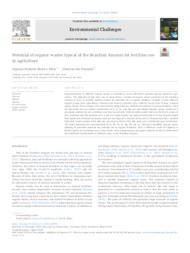Potential of organic wastes typical of the Brazilian Amazon for fertilizer use in agriculture.
Potential of organic wastes typical of the Brazilian Amazon for fertilizer use in agriculture.
Autoria: SILVA, A. R. B. e; FRANZINI, V. I.
Resumo: Characterization of different organic wastes is essential to reveal alternative nutrient sources useful for agriculture. The objective of this work was to characterize a variety of organic wastes generated in the Brazilian Amazon in order to identify nutrient sources for potential use as organic fertilizers. Samples of nine different organic wastes from agricultural, livestock and forestry activities were collected in the state of Par´a, Amazon region, Brazil. These samples were characterized using reference methods for analyses of organic fertilizers. Palm oil mill boiler ash was highly concentrated in P, K, Ca, and Mg and also highly alkaline, being considered a promising material for use as fertilizer and lime in acid soils. Palm oil mill decanter cake was the best N source; it also contained relevant amounts of K, S, and Zn. Cattle manure was more concentrated in N and oil palm empty fruit bunch in K. Residual eucalyptus charcoal was high in Ca but also in Na and Al. Oil palm fruit fiber, oil palm fruit shell, wood sawdust of the pile top, and wood sawdust of the pile slope were consistently poor in nutrients. All wastes presented low concentrations of As, Ba, Cd, Cr, Hg, Pb, and Se. This study identified organic wastes differing in prevalent nutrients for potential use as organic fertilizers. Such a difference could be explored in further studies by combining two or more wastes with complementary prevalent nutrients in order to better meet the nutritional requirements of different crops in the Brazilian Amazon.
Ano de publicação: 2024
Tipo de publicação: Artigo de periódico
Unidade: Embrapa Amazônia Oriental
Observações
1 - Por padrão são exibidas publicações dos últimos 20 anos. Para encontrar publicações mais antigas, configure o filtro ano de publicação, colocando o ano a partir do qual você deseja encontrar publicações. O filtro está na coluna da esquerda na busca acima.
2 - Para ler algumas publicações da Embrapa (apenas as que estão em formato ePub), é necessário ter, no celular ou computador, um desses softwares gratuitos. Sistemas Android: Google Play Livros; IOS: iBooks; Windows e Linux: software Calibre.
Acesse outras publicações
Acesse a Base de Dados da Pesquisa Agropecuária (BDPA) para consultar o acervo completo das bibliotecas da Embrapa.

